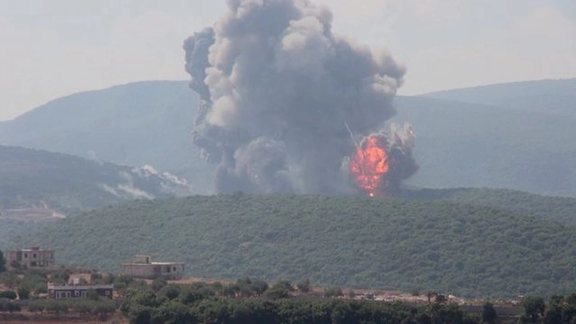Israel, Hezbollah signal desire to avoid further escalation

Israel and the Iran-backed Hezbollah exchanged messages on Sunday signaling that neither is seeking further escalation, with both parties conveying that the recent clashes are "done.”

Israel and the Iran-backed Hezbollah exchanged messages on Sunday signaling that neither is seeking further escalation, with both parties conveying that the recent clashes are "done.”
According to two diplomats who spoke to Reuters, the two side are not interested in more escalation but the potential for further conflict remains, with the specter of Iran's influence hovering over the situation.
In one of the most significant escalations in the ongoing border conflict, Hezbollah launched a large barrage of rockets and drones at Israel early on Sunday. Minutes before, Israel preempted with a wave of airstrikes, deploying approximately 100 jets to target Hezbollah launchers in an effort to prevent a larger attack.
This latest clash marks the most intense fighting between the two sides in over ten months, igniting fears of a broader regional conflict that could draw in Hezbollah's backer, Iran, and Israel's key ally, the United States.
Despite the fierce exchanges, both Israel and Hezbollah have signaled a desire to avoid further escalation for now. Hezbollah’s leader, Sayyed Hassan Nasrallah, stated in a televised address that the group's attack, which was a retaliation for the assassination of senior commander Fuad Shukr last month, had been carried out "as planned." Nasrallah denied Israeli military claims that their pre-emptive strikes had thwarted a more extensive Hezbollah offensive, insisting that the group had not intended a larger attack. However, he warned that Hezbollah would assess the impact of its operation before deciding on any further action.
The potential for a wider conflict remains palpable. Any significant spillover in the fighting, which runs parallel to the ongoing war in Gaza, could lead to a regional conflagration involving Iran and the United States, which stands as Israel's principal ally.
As the death toll rises, with three confirmed fatalities in Lebanon and one in Israel, both sides have expressed a cautious willingness to de-escalate but have left the door open for future strikes.
Reports from Israel’s Channel 12 indicate that Israel has communicated to Hezbollah that it has no interest in escalating the conflict further and that the recent attacks were aimed solely at neutralizing a significant threat. Israeli officials have echoed this sentiment, with former Foreign Minister Eli Cohen emphasizing that Israel is not seeking a full-scale war.
In one of the rare Iranian reactions to the Hezbollah attacks, Parliament Speaker Mohammad-Bagher Ghalibaf said Hezbollah "successfully targeted Israel's sensitive military and intelligence sites" in its Sunday operation. "Today's defeat of Israel is on par with its defeat in the 2006 operation, and they cannot cover up this loss."
Iran's Supreme Leader Ali Khamenei avoided talking about the Hezbollah operation and the ongoing fight against Israel but made ambiguous comments about war during a religious ceremony. "War and fighting in the time of sword and blade took another form and at the time of atoms, virtual space and artificial intelligence, has taken another form...This battle takes different shapes based on the conditions and requirements [of time and place]."
In another part of the speech, he said, "In this prayer you vow to 'fight, whomever fights [the front of Islam] until judgment day'. This fight is eternal."
The Israeli ambassador to the United States, Michael Hertzog, told CBS News that he believes Iran is "contemplating an attack on Israel, but decided for now to put it on hold," citing a strong US military presence in the region as a key deterrent.
The Pentagon announced on Sunday that US Defense Secretary Lloyd Austin has directed two aircraft carrier strike groups to remain in the Middle East, bolstering the US military presence. This decision marks a shift in strategy, as the initial plan had been to deploy the Abraham Lincoln carrier strike group to replace the Theodore Roosevelt carrier strike group in the region.
Earlier, General Charles Brown, the top US military official and Chairman of the Joint Chiefs of Staff, arrived in Israel just hours after significant cross-border clashes between Israel and Hezbollah in Lebanon. Brown is scheduled to meet with senior Israeli military officials during his visit.